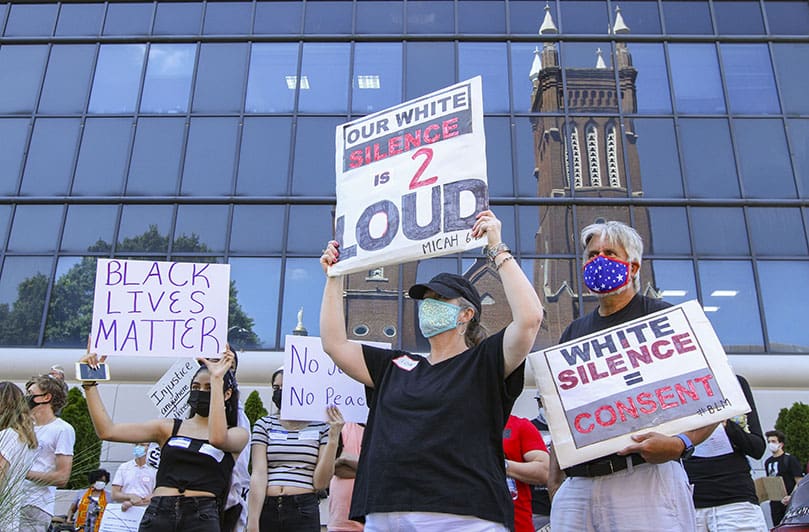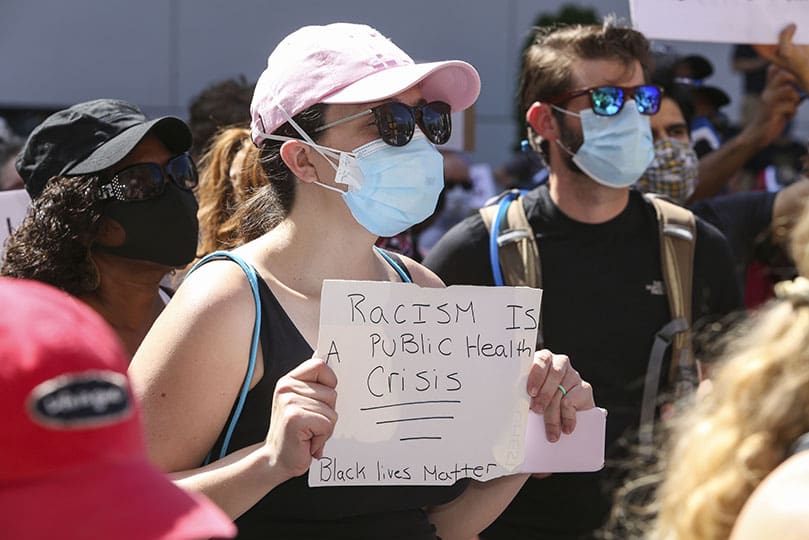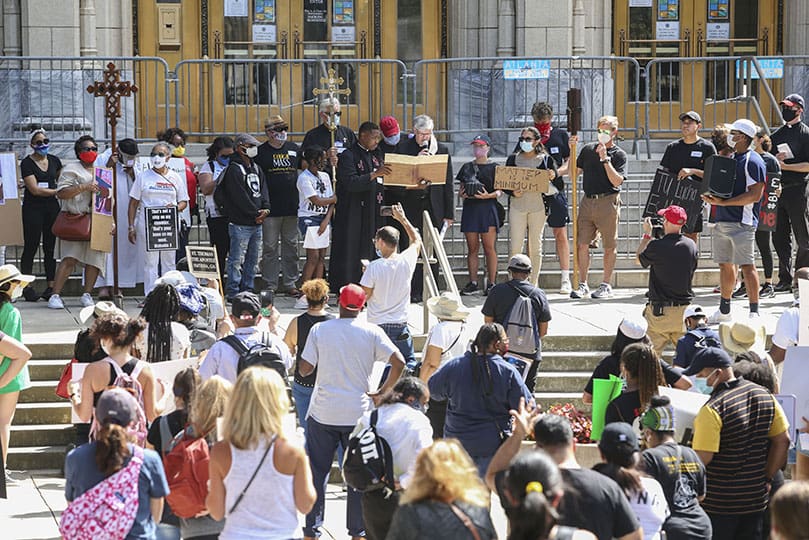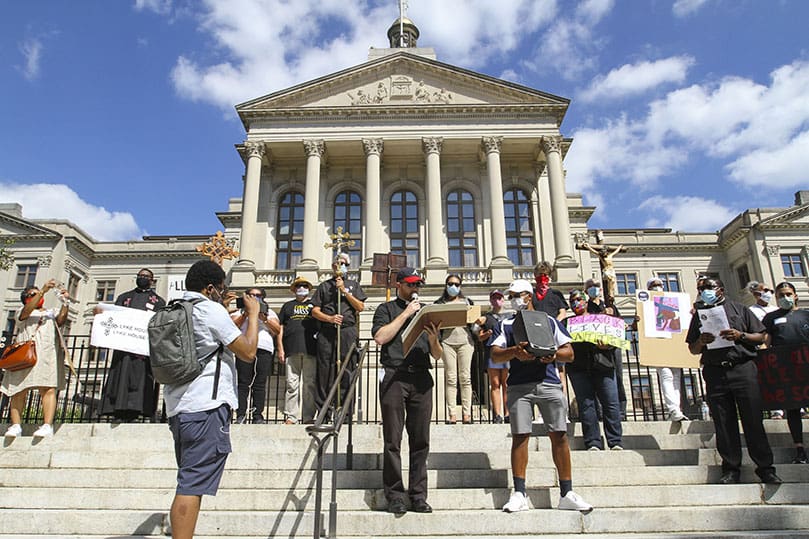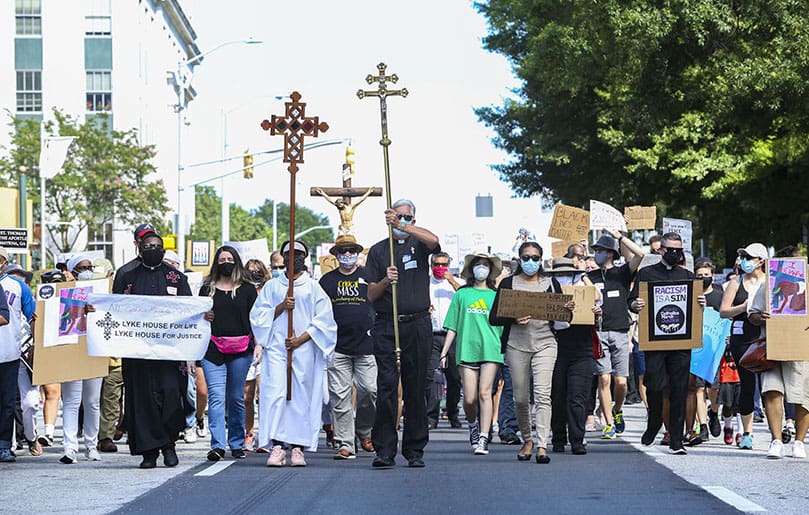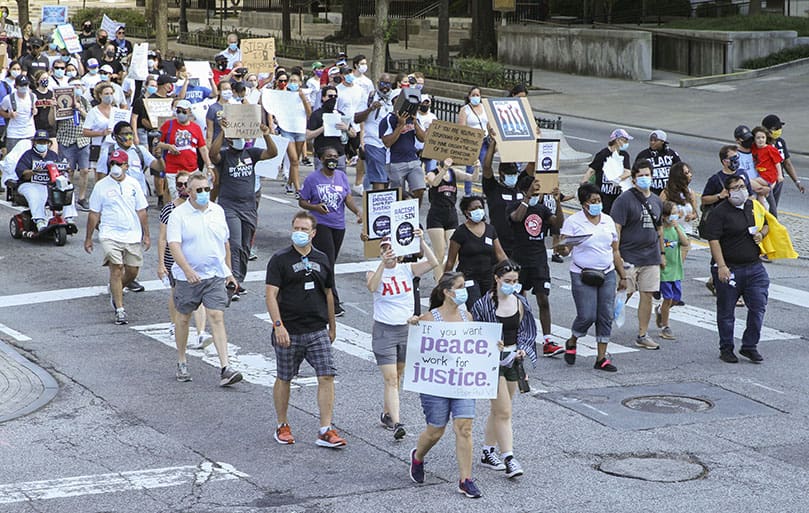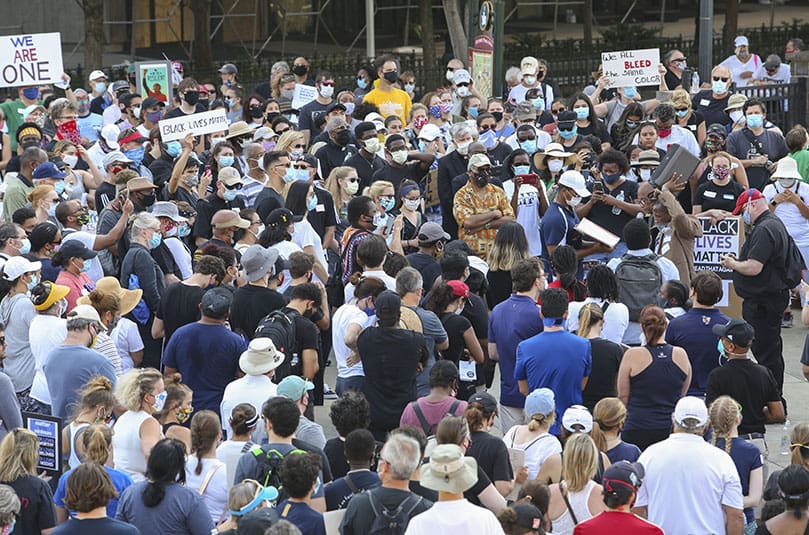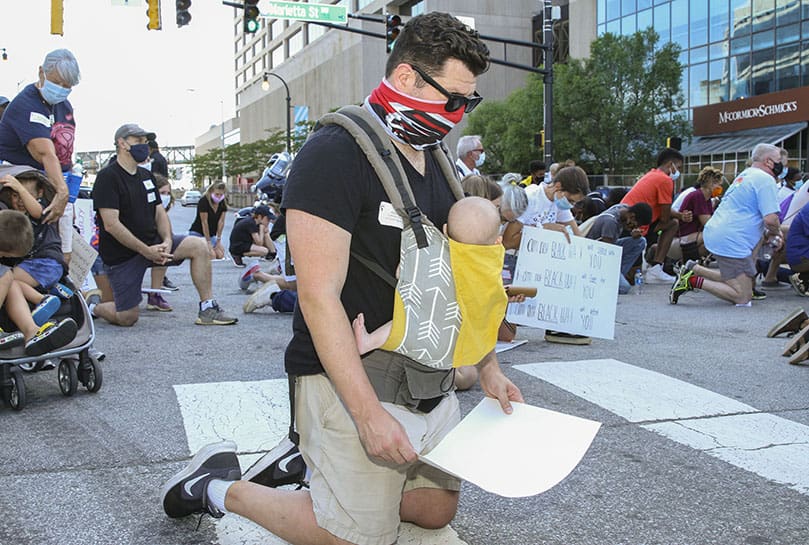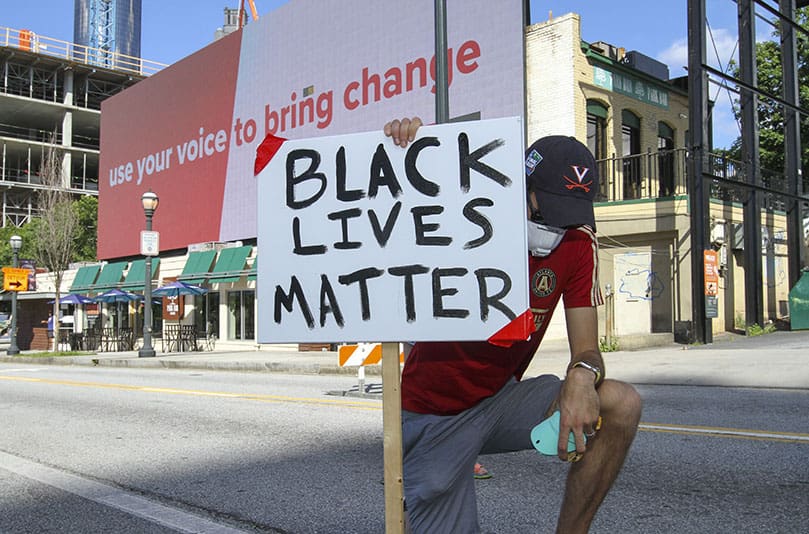Standing across the street from the Shrine of the Immaculate Conception, Atlanta, (l-r, holding signs) sibling teens Emily and Arely Ramirez from St. Patrick Church, Norcross, and Lisa and Bruce Downs from Prince of Peace Church, Flowery Branch, display signs as they gather with hundreds of other Catholics for a June 11 march for racial justice from the church to Centennial Olympic Park. Photo By Michael Alexander
Atlanta
Catholics march in downtown Atlanta for racial justice
By SAMANTHA SMITH, Staff Writer | Published June 12, 2020 | En Español
ATLANTA–On Thursday, June 11, more than 400 Catholics filled Dr. Martin Luther King Jr. Drive in front of the Shrine of the Immaculate Conception in Atlanta to protest racism and racial injustice.
The peaceful protest brought together Catholics of all ages and races, including families, students, teachers, priests, deacons, religious, chancery staff and local faith organizations and ministries.
Volunteers from the Shrine of the Immaculate Conception greeted attendees. Name tags were provided to help people recognize familiar faces hidden by masks, a required safety precaution due to the COVID-19 pandemic. Social distancing was also encouraged during the march.
Cathy Harmon-Christian was one of many volunteers from the Atlanta shrine greeting marchers. She has been a member of the parish for about five years.
Harmon-Christian was gratified by the experience, seeing such a multicultural gathering of Catholics.
“I was grateful to see this show of solidarity,” she said.
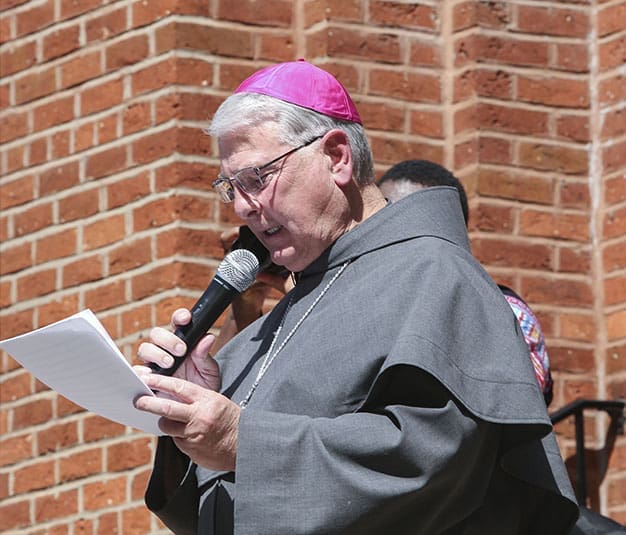
After a reading from the Book of the Isaiah, Archbishop Gregory J. Hartmayer, OFM Conv., gives some remarks from the steps at the Shrine of the Immaculate Conception, Atlanta. Photo By Michael Alexander
For those who did not feel safe or were unable to join in person, a livestream of the march was available, with some 750 people watching from beginning to end. Online participants also sent in their names to be worn by attendees.
George Harris led a call and response on the steps of the shrine at the beginning of the protest. He is a member of St. Anthony of Padua Church in Atlanta and marched with his wife and two daughters.
Originally from Birmingham, Alabama, Harris grew up knowing victims of the 16th Street Baptist Church bombing.
“That was the event that shocked the nation, shocked the world,” said Harris. “The murder of George Floyd was one of those events that shocked a number of people’s consciousness.”
I’m here because it’s the right thing to do and the right place to be, said Harris.
An examination of conscience
“This is a peaceful and prayerful march for justice,” said Father Victor Galier, pastor of St. Anthony of Padua Church and member of the planning committee for the march.
“We must examine our own consciences for the times we have let racism take root in our conversations, our lives and in our nation.”
Plans for the protest were set in motion six days prior to the march and a Facebook event was created and shared three days before. Father Galier was hoping for at least 50 people, but attendance exceeded that number by hundreds.
“At the very least, the people of St. Anthony of Padua are hurting,” said Father Galier of his community. The parish in Atlanta’s West End consists of predominantly black Catholics.
The pastor has been protesting racism and injustice in Atlanta over the past couple of weeks in demonstrations, which were sparked by the recent murders of black Americans, including Ahmaud Arbery, Breonna Taylor and George Floyd.
St. Anthony of Padua parishioners shared their gratitude with Father Galier for participating in the marches. Father Galier called Father Dennis Dorner, parochial vicar at the Shrine of the Immaculate Conception, and Father Bryan Small, pastor of Sts. Peter and Paul Church in Decatur about a collaboration. The priests rallied together laity, clergy and archdiocesan support to pull together the march.
The livestream of the march included commentary, led by Father Dorner. Guest commentators were Ashley Morris, associate director for the Office of Intercultural Ministries at the Archdiocese of Atlanta; Father Bruce Wilkinson, former pastor of Most Blessed Sacrament Church, Atlanta, and Father Llane Briese, assistant professor of sacred Scripture at St. Vincent de Paul Regional Seminary in Boynton Beach, Florida.
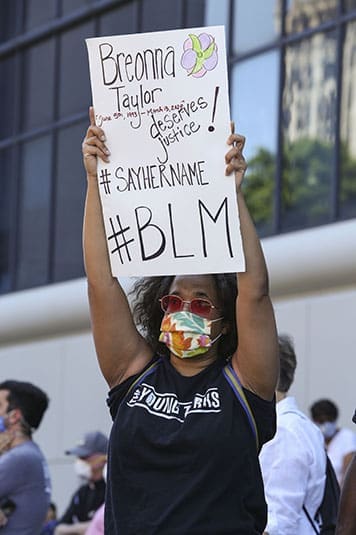
As Catholics in downtown Atlanta gather for the march, Dr. Lena Hamilton, a sixth and seventh grade teacher at St. Thomas More School, Decatur, holds up a sign while she stands along Central Avenue, across from the Shrine of the Immaculate Conception. Photo By Michael Alexander
“Racism is alive and well in our nation and world,” said Father Galier. “As people of faith, we must, because the Gospels called us, take a stand against sin. It’s no longer good enough to not be racist ourselves. We have to be actively anti-racist and work for the common good.”
Archbishop Gregory J. Hartmayer, OFM Conv., along with Bishop Bernard E. Shlesinger III participated in the march and led prayers.
History, hope and conversion are the reasons Archbishop Hartmayer gives to those who think marching against racism is not important.
“We want to join generations of people who left their homes and took to the streets to demand justice,” said the archbishop. “Racism continues to plague this country. And the time is right, once again, to seek radical change within our society and ourselves.”
“Our African American families are hurting,” said Archbishop Hartmayer. “We need to listen to their voices. We need to walk with them on this new journey. We march because we are in need of another conversion. And we start by gathering as a community to share Scripture and prayer.”
A march of prayer, song and solidarity
With crosses and incense, Catholics marched 1.1 miles through downtown Atlanta. Stops included Atlanta City Hall and the Georgia State Capitol. The march ended at Centennial Olympic Park.
A nearby group of protesting healthcare workers briefly joined the march for prayer and song.
Marching was something Stan Hinds watched his teachers do growing up.
“They were on the Edmund Pettus Bridge while we were in class behaving,” said Hinds, referring to the National Historic Landmark in Selma, Alabama–site of the beatings of civil rights marchers during the first march for voting rights.
He continues this example for his students as a teacher at Cristo Rey Atlanta Jesuit High School since it opened. Hinds has also been a member of Sts. Peter and Paul Church in Decatur for 27 years.
“I’ve been doing this all my life and will continue to do it,” said Hinds. “Hopefully, my students and my kids will continue to do it. We’ll keep doing it until we get it right.”
Song, prayer and Scripture filled the normally busy rush hour streets of downtown Atlanta during the protest. As participants walked to Centennial Olympic Park, there was a “Say Their Name” litany for those who have died in the fight against racism. The response was, “Rest in Peace.”
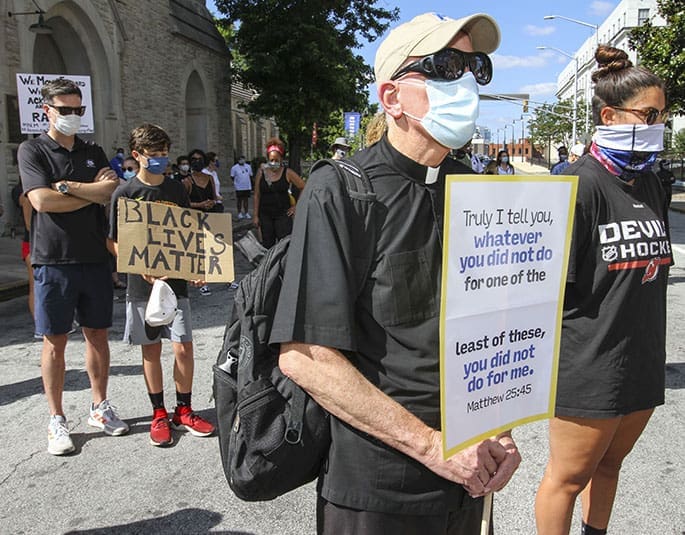
During a moment of prayer, Deacon Michael Garrett of St. Thomas the Apostle Church, Smyrna, joins other Catholics as they stand on Washington Street, in front of the Georgia State Capitol, before proceeding to Centennial Olympic Park. Photo By Michael Alexander
“That was very powerful and very different,” said Harmon-Christian, who has been involved and engaged in many protests throughout the years for various issues. “This is the first one that I felt really focused on lament, which is an important aspect of our faith.”
At the last stop, there was a brief reading of the Lord’s Passion. Following the moment Jesus died, marchers knelt for eight minutes and 46 seconds, honoring lives lost in the ongoing fight for racial equality. It was also symbolic of the amount of time a Minnesota police officer held George Floyd on the ground with his knee on Floyd’s neck.
Catholics were encouraged to “listen, learn and act” after the march to help the fight against racism. Suggestions were shared with attendees, such as encountering people on the margins, listening to stories, becoming educated about racism and actively promoting justice. A list of recommended films and online resources were shared with marchers. The list included films such as “True Justice: Bryan Stevenson’s Fight for Equality” and movements like Campaign Zero to end police brutality, and to work for passage of hate crime legislation in Georgia.
The June 11 event is just the beginning, said Father Galier.
“We really have to be working at this all of the time and dismantle the structure of sin wherever we find it,” he said.
“If we are to be moved with empathy and to promote justice, let us ask the Holy Spirit to enter into our work here today and beyond,” said Archbishop Hartmayer. “This march is just the start of the work to be done.”
